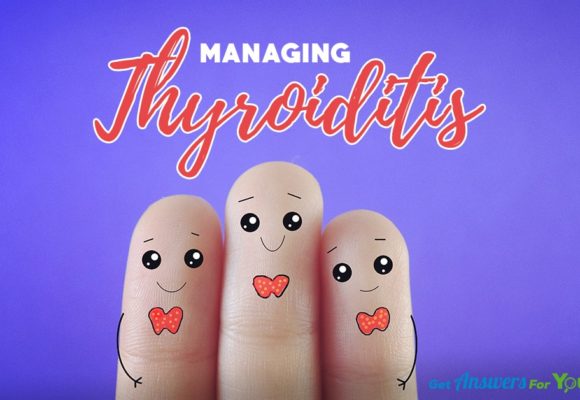1) Grab a FREE copy (Value $14.95) of one of my books Thyroid Symptom Overload
Just pay shipping $7.95 for any US orders. Or, if you want to pay full price plus shipping, order from Amazon :)
2) Take our Thyroid Quiz today and find out what "Thyroid Type" you have
This quiz will help you quickly discover where your symptoms are stemming from.
3) Join Our Thyroid Advocate Membership Site - Natural Thyroid Academy
FREE for a limited time. No credit card required.
4) Work with me and my team privately
Schedule your FREE 15 minute phone consultation and we can find out the best way to help you specifically.
Are you going through a phase of increased heartbeat, flushing of the face, heat intolerance followed by another phase of extreme fatigue and lethargy, cold intolerance and weight fluctuations? If yes, your immune system can be the culprit.
The immune system, the army of your body, can be mistakenly killing its own soldiers and weakening the defense. Let’s find out what can happen in your body that is affecting your thyroid and giving you the symptoms of “Grave’s disease”.
Graves’ Disease and Overactive Thyroid:
Robert Graves, discoverer of the disease, reported on his observations of the disease characterized by “violent and long palpitations (rapid heartbeat) in females” associated with enlargement of the thyroid gland (1835).
Graves’ disease is an autoimmune condition in which thyroid gland starts producing hormones more than required. It has a peak incidence between the ages 20 and 40. Women are affected up to seven times more than men. So, basically graves’ disease affects middle aged women more.
What Triggers Overproduction Of Thyroid Hormones?
Graves’ disease is the consequence of a defective immune system. The immune system is responsible for protecting our bodies against any harmful foreign substance. But a fault in immune system results in its inability to differentiate between what is harmful and what is not. It starts attacking the healthy tissues of body by making autoantibodies. Same happens in Graves’ disease. Our immune system causes the production of multiple autoantibodies namely thyroid stimulating immunoglobulin, TSI. Graves’ disease is characterized by a breakdown in self-tolerance to these antigens, of which the most important is the TSH receptor.
Role Of Autoantibodies:
Thyroid stimulating hormone (TSH) is released by a gland in the brain known as the pituitary gland. TSH binds to thyroid gland receptors and acts as a master to order the thyroid to function. So high TSH levels cause hyperthyroidism and low levels cause hypothyroidism.
- Thyroid Stimulating Immunoglobulin:
In Graves’ disease, one of the antibodies produced is thyroid stimulating immunoglobulins. They bind to the receptor allocated for TSH and it tricks the thyroid to work. The result is overactivity of thyroid gland causing overproduction of thyroid hormones. Hyperthyroidism symptoms consequently develop.
- TSH-binding Inhibitor Immunoglobulin:
These antibodies bind to the TSH receptors but don’t activate them. The negative effect is TSH receptors get blocked which prevents TSH from binding to its receptor and carrying out its function. In other words it inhibits thyroid cell function. The coexistence of stimulating and inhibiting immunoglobulins explains why some patients with Graves’ disease spontaneously develops episodes of hypothyroidism too. This phenomenon is very common.
Clinical Features Of Graves’ Disease:
The clinical manifestations of graves’ disease include those common with hyperthyroidism such as palpitations, rapid heartbeat, weight loss, heat intolerance, anxiety, trouble sleeping, diarrhea, difficulty breathing and hand tremors, and a triad of features specific to the grave’s disease. The triad of manifestations which includes the three basic clinical features of graves’ disease are as follows:
- Thyrotoxicosis:
Thyrotoxicosis means an excess of thyroid hormone in the blood. It’s caused by a hyper functioning thyroid and is present in all cases of Graves’ disease. Thyrotoxicosis can be the cause as well as the effect of enlarged thyroid gland known as goiter. The hyperproliferation or enlargement of thyroid gland is a chief sign of graves’ disease.
- Ophthalmopathy (Eye Problems):
Ophthalmopathy is a disorder of the eyes. It is associated with almost 40% of patients having Graves’ disease (Guyton and Hall, ninth edition, p726) Graves ophthalmology is an inflammatory disorder in which the muscles and tissues behind the eyes become swollen. The eye balls may stick out or bulge farther than normal known as exophthalmos.
- Dermopathy (Skin Problems):
Dermopathy is the disease of skin. Graves’ disease is associated with graves dermopathy. This is a skin condition characterized by swollen red skin commonly affecting both the foot and shin. Graves dermopathy is almost always accompanied by graves ophthalmopathy. And dermopathy alone is seen in few cases. (Kumar and Monica, Dermatoendocrinol, Jan-Dec, 2014)
Diagnosis Of Graves’ Disease:
Diagnosis is based on the common signs and symptoms associated with the disease. To make an accurate diagnosis, your primary physician or endocrinologist will order blood tests. Following blood tests confirm the diagnosis.
- Low TSH Level:
Blood tests showing decreased TSH level can indicate Graves’ disease. The low TSH level is basically a compensatory action by the pituitary gland. As the thyroid is already making enough hormone, the pituitary releases less TSH in an attempt to stop thyroid hormone production. It is the normal negative feedback mechanism.
- High T3 And T4 Level:
For further accuracy, serum level of T3 and T4 is checked. An elevated level confirms the diagnosis. T3 and T4 are the thyroid hormones that are produced excessively in graves’ disease under the action of thyroid stimulating immunoglobulins (a type of antibody). TSI basically misdirects the thyroid to make too much hormones and acts as TSH.
- Presence Of TSI Antibodies:
Thyroid-stimulating immunoglobulins are the antibodies produced by the faulty immune system responsible for thyrotoxicosis. Presence of TSI in the blood gives positive findings. TSI also binds to tissues in the eyes causing exophthalmos (bulging eyes) and under the skin causing pretibial myxedema (thickening of skin).
- Radioactive iodine uptake:
The thyroid needs iodine to synthesize hormones. A small amount of iodine is given and later the amount is measured. The amount of iodine uptake helps determine the cause of disease.
Treatment Of Graves’ Disease:
The treatment goal for graves’ disease is to control the thyroid hormone production and keep it in limits. The possible adverse outcome of the treatment is hypothyroidism. So, the patient needs to be monitored throughout the treatment by their medical doctor or endocrinologist.
- Anti-thyroid medications:
Anti-thyroid drugs like propylthiouracil and methimazole are often a first line of treatment for graves’ disease. They interfere with the thyroid’s ability of iodine uptake for the normal synthesis of hormones. Methimazole is contraindicated in the first trimester of pregnancy.
- Radioactive iodine:
Radioactive iodine is used to selectively destroy overactive cells of thyroid gland. Radioiodine is taken orally. As iodine is needed by the thyroid to synthesize hormones, this radioactive iodine is also taken by the thyroid gland. But being radioactive, this iodine destroys thyroid cells. It causes the thyroid to shrink and symptoms to lessen. This therapy however is not recommended if you already have eye problems. Please consult your doctor.
- Surgical removal:
Surgery to remove the whole or a part of thyroid is done in extreme cases. After surgery, the body needs to be supplied by normal amounts of thyroid hormones. In addition, you still have to address the immune compromise as well.
Can Graves’ Disease Be Fatal?
Without treatment, graves’ disease can pose serious life threats. It can lead to heart problems, weak bones and can also be fatal. Thyroid storm is a relatively rare condition, but it can be life threatening if not treated.
Conclusion:
Graves’ disease is the most common cause of endogenous hyperthyroidism that is autoimmune in nature. The immune system produces antibodies which direct the thyroid to produce more and more hormones. This causes damage to various parts of the body, resulting in symptoms described above.
References:
https://www.endocrineweb.com/conditions/graves-disease/graves-disease-overview
http://www.mayoclinic.org/diseases-conditions/graves-disease/symptoms-causes/dxc-20337218
https://www.thyroid.org/graves-disease/
http://www.webmd.com/women/understanding-graves-disease-basics#1
http://www.webmd.com/eye-health/tc/hyperthyroidism-graves-ophthalmopathy-topic-overview
https://www.ncbi.nlm.nih.gov/pmc/articles/PMC4580047/
https://www.endocrineweb.com/conditions/graves-disease/graves-disease-diagnosis








